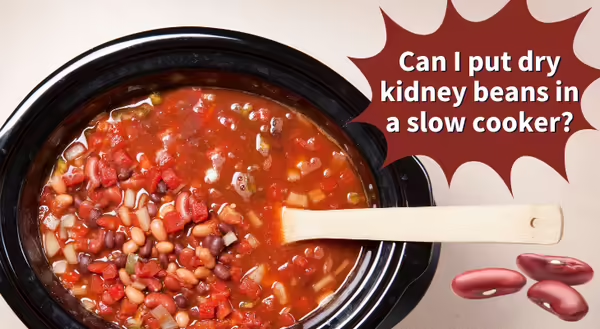
Slow cookers, commonly known by one of the brand names Crock-pot®, are a popular kitchen appliance used to make a variety of soups, stews, desserts, or one-pot meals. One common ingredient in soups and stews is kidney beans. Purchasing dry beans and soaking them at home is an excellent way to save money and control additional added sodium. Did you know undercooked kidney beans are toxic if not soaked and boiled before putting them into a slow cooker?
Why should you soak and boil dry kidney beans before putting them in a slow cooker?
Kidney beans contain different types of sugar-binding proteins called lectins. Undercooked kidney beans have a high concentration of Phytohaemagglutinin (PHA), a plant lectin that is toxic to humans. Raw kidney beans have one of the highest amounts of PHA compared to other beans. Raw white (cannellini) kidney beans contain about one-third as much PHA as kidney beans. Slowly heating raw kidney beans in a slow cooker may increase the toxicity of the beans. Studies have found slow cookers do not reach a high enough temperature to destroy the harmful bacteria in undercooked beans. The PHA toxin is destroyed at 212°F when cooked for at least 10 minutes. Beans prepared in a slow cooker often only reach an internal temperature of 167°F.
How will I know if I get sick?
Eating as few as four undercooked kidney beans could lead to nausea, abdominal pain, diarrhea, or vomiting. Recovery is typically 3 to 4 hours after symptoms start, although some cases have resulted in hospitalizations.
How to reduce the risk when using dry kidney beans
- Soaking beans for at least 5 hours
- Pouring away water
- Boil briskly in fresh water for 30 minutes before using them to reduce the levels of PHA found in kidney beans
- Use beans as desired. Store unused boiled kidney beans covered in the refrigerator for up to 4 days
Are canned kidney beans safe in a slow cooker?
Canned kidney beans are safe to use without further boiling since they are already precooked before processing.
Sources:
Kumar, S., Verma, A. K., Das, M., Jain, S. K., & Dwivedi, P. D. (2013). Clinical complications of kidney bean (Phaseolus vulgaris L.) consumption. Nutrition, 29(6), 821–827. https://doi.org/10.1016/j.nut.2012.11.010
Nutrition, C. for F. S. and A. (2015, August 20). Bad Bug Book - BBB - Phytohaemagglutinin. Wayback.archive-It.org. https://wayback.archive-it.org/7993/20170406190307/https://www.fda.gov/Food/FoodborneIllnessContaminants/CausesOfIllnessBadBugBook/ucm071092.htm
About the Author: Lisa Peterson is an Illinois Extension Nutrition and Wellness Educator serving Christian, Jersey, Macoupin, and Montgomery counties in west central Illinois. Her interests include using social media marketing and technology to translate research-based information in food safety, optimal nutrition, preparing and safely preserving food, preventing and delaying chronic disease through diet management, and developing innovative methods for implementing wellness in the workplace. She has a passion for translating science-based research for consumers to use locally. She dedicates her work to improving the lives of the citizens of Illinois by providing them with the tools to make safe, healthy, and informed decisions. You can reach Lisa at lap5981@illinois.edu or at (217) 532-3941